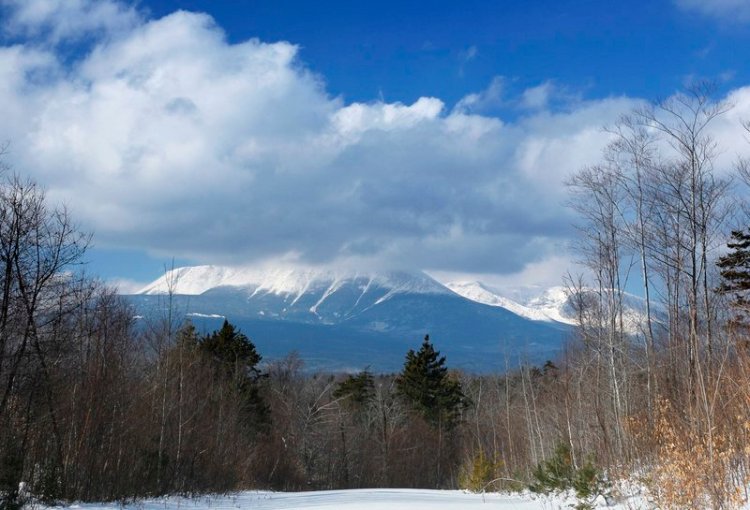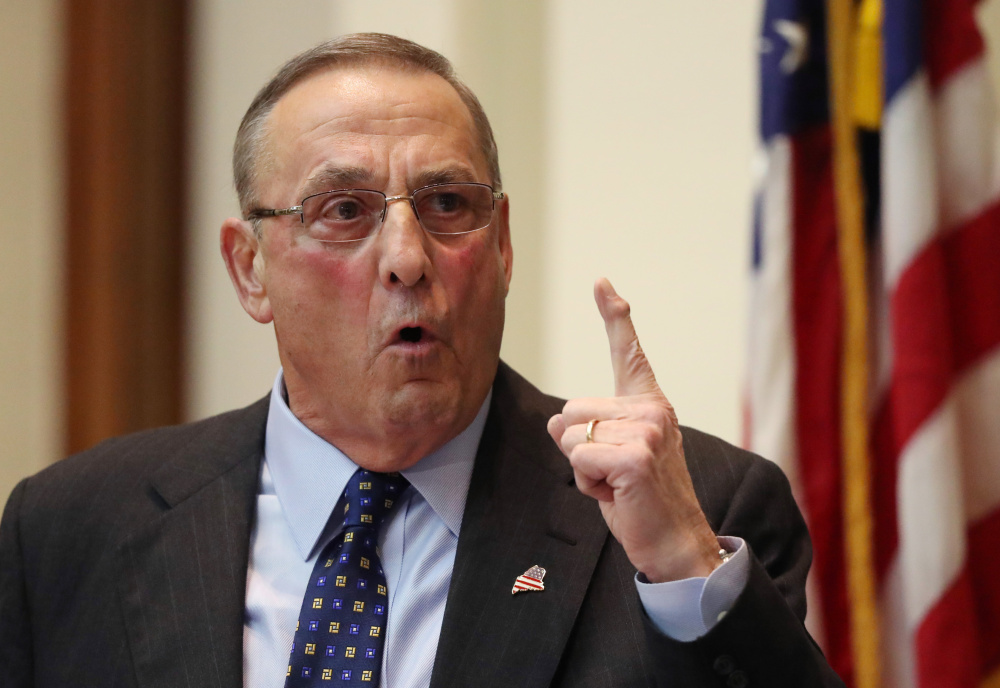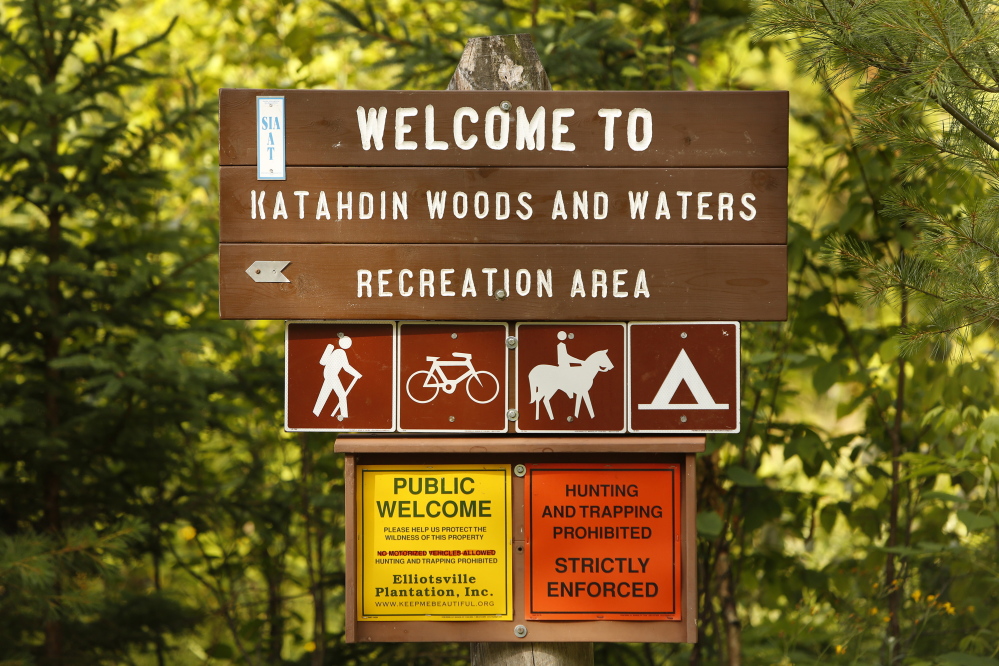AUGUSTA — Gov. Paul LePage is asking President Trump to reverse the national monument designation on 87,500 acres in Maine’s North Woods.
In a letter sent Feb. 14, LePage urged Trump to undo then-President Obama’s creation of the Katahdin Woods and Waters National Monument and, in so doing, test the legal waters surrounding presidential authority.
“Regarding the national monument designation, ‘those cold timid souls who neither know victory or defeat’ argue that you, as president, cannot undo a national monument because it has never been done before,” LePage wrote. “They also never envisioned President Trump. I strongly urge you to undo the designation and return the land to private ownership before economic damage occurs and traditional recreational pursuits are diminished.”
Last August, Obama used his executive authority to create the Katahdin Woods and Waters National Monument on land just east of Baxter State Park, after a lengthy debate over land conservation and economic development in the region. The 87,500-acre monument offers opportunities for hiking, camping, fishing and paddling along the East Branch of the Penobscot River and Wassataquoik Stream as well as hunting and snowmobiling in designated areas.
Conservationist and entrepreneur Roxanne Quimby donated the land to the National Park Service, allowing Obama to designate the national monument unilaterally without the congressional approval required for national parks.
LePage has been a vocal opponent of giving the National Park Service a toehold in the North Woods, calling the designation “a grave injustice … to the people of Maine and our forest economy” in his letter.
LePage’s letter isn’t the first time Trump has heard from LePage or other monument opponents.
During an Oct. 15 campaign stop in Bangor, Trump accused Obama of making the designation with “no consideration” for local concerns or impacts on the forestry industry. He also pledged to “protect the right of people and the people of Maine to use their own land.”
The White House Press Office did not respond Wednesday to a request for comment on LePage’s letter.
EARLY EVIDENCE OF LOCAL BENEFIT
There is mounting evidence that the monument is already having a modest positive impact on the Katahdin region’s economy, despite LePage’s objections.
Real estate professionals, lodge operators and some business owners in the Katahdin region have said the monument is drawing more visitors and potential clients to the area. Quimby’s foundation, Elliotsville Plantation, has spent more than $250,000 upgrading roads, bridges and other infrastructure on the property, and the Butler Conservation Fund plans to spend $5 million on a new outdoor education facility and trails near the monument.
Since the designation, many former opponents also have pledged to work with the National Park Service to ensure the monument helps the local economy.
Lucas St. Clair, Quimby’s son and the public face of the campaign to create a North Woods monument, said the positive changes are “palpable.” He said it is disappointing that LePage has failed to recognize the interest and investment the monument already is garnering in the Katahdin region.
“Things are doing very well in a short period of time,” St. Clair said. “The Katahdin region has some momentum right now and the governor wants to rehash old fights.”
Within weeks of Trump’s election in November, outspoken critics of Katahdin Woods and Waters National Monument, as well as opponents of other monuments nationwide, began discussing whether the president-elect could reverse Obama’s actions.
Supporters of the national monuments, meanwhile, argue that federal law prohibits presidents from scrapping earlier designations, although Congress has that power. Although past presidents have modified national monuments created by their predecessors – sometimes reducing their size, and often elevating them to full national parks – the issue of abolishing monuments apparently has never been litigated in court.
A CALL TO HELP TRUMP VOTERS IN MAINE
In his letter to Trump, LePage said another option would be to allow the state to manage the federal land. He also alluded to Trump’s victory in Maine’s 2nd Congressional District, which resulted in a historic split of Maine’s Electoral College votes.
“I remain hopeful and optimistic that the overwhelming support you received from voters in this region, especially those in our 2nd Congressional District, will result in bold policies that create jobs, restore our national identity, ensure our place in the world and make the Maine woods great again,” LePage wrote.
Trump won the 2nd District by 52-41 percent, but lost the statewide vote to Democrat Hillary Clinton by 48-45 percent.
St. Clair said he does not believe Trump – or any president – has the power to reverse a predecessor’s designation, and predicted that doing so in the Katahdin region would be even more problematic. The deeds transferring ownership from Elliotsville Plantation to the park service contain numerous, complicated contractual obligations, he said. And the $40 million endowment that Elliotsville Plantation set up for the monument through the National Parks Foundation can only be administered through units of the National Park Service, not through the state if it manages the lands.
“So that $40 million would go away as well,” St. Clair said. “What Gov. LePage has proposed is the loss of a $40 million endowment and a great gift to the state of Maine that is already proving to be an economic draw to the region and to the state.”
DOES TRUMP HAVE AUTHORITY TO RESCIND?
Trump is receiving similar intervention requests from other critics of Obama’s national monument designations.
The Associated Press reported Wednesday that Sen. Orrin Hatch, R-Utah, told the Utah House of Representatives that he had a lengthy discussion with Trump about that state’s new Bears Ears National Monument. Hatch said he expected Trump to repeal the designation. And commercial fishermen from New England and mid-Atlantic states are hoping that either Trump or Congress will repeal the Northeast Canyons and Seamounts Marine National Monument protecting nearly 5,000 square miles of underwater ecosystem in southern New England.
However, any attempt by Trump to rescind some of Obama’s monument designations likely would trigger a court challenge. A recent legal analysis conducted for the National Parks Conservation Association determined that the president “has no power unilaterally to abolish a national monument under the Antiquities Act of 1906.”
“For over one hundred years, the Antiquities Act has allowed presidents to declare national monuments and preserve worthy lands for the enjoyment of all Americans and future generations,” reads the February 2017 analysis. “There are today national monuments in 31 states. For all Americans they offer recreational opportunities and preserve a heritage of beauty, scientific marvels and human achievement. But the Antiquities Act and subsequent legislation reserved for Congress, which has constitutional authority over public lands, the sole power to revoke such a designation.”
Any move in Congress to rescind a national monument designation likely would face stiff opposition from Democrats.
Kevin Miller can be contacted at 791-6312 or at:
Twitter: KevinMillerPPH
Send questions/comments to the editors.






